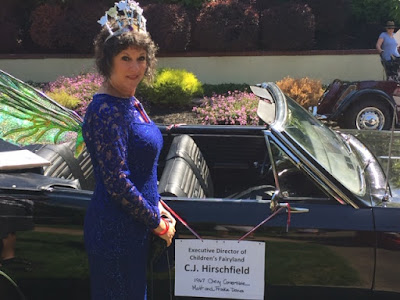by C.J. Hirschfield
I’ve always loved Piedmont’s Fourth of July parade. It’s just the right combination of community and capriciousness; of service and steam engines; bagpipes and balloons. And dogs. And kids. And how can you not love a parade that features “Peace and Love” in its theme, on a day devoted to patriotism?
I’d always been a Piedmont parade viewer, but this year for the first time, I was actually in the parade, driven in a super-cool ’67 Chevy convertible. It was such an honor to be recognized for leading Children’s Fairyland for the last 17 years; I was once again reminded of how many locals—both young and old—have made beautiful memories at our community’s special storybook theme park—the nation’s first. I had a ton of fun!
 |
| Fairyland’s executive director and the car she drove in as part of Piedmont’s Fourth of July Parade. |
I’ve been reflecting on the parades I’ve been able to be part of over the years: Fairyland leads the Oakland Pride Parade, has represented in the Black Cowboys’ Parade, and while it lasted, the Oakland Holiday Parade.
But my very first parade was a surprise, historic, emotional, and absolutely unforgettable.
The year was 1978, and I was a twenty-something living the dream in San Francisco, and running the city’s public access channel. My childhood friend Nancy had also moved to the Bay Area from our hometown of Los Angeles, and I knew that she was part of a marching band called the Lavender Harmony Band, and that they were scheduled to be part of that year’s Gay Freedom Day Parade, as it was then called. Over 250,000 were expected to participate; it turned out to be only a few months before the assassination of gay rights leader Harvey Milk, and years before the AIDS scourge would cost us so many. The parade was political—how could it not be, with State Senator John Briggs trying to pass a bill to prohibit gays from teaching in the schools, and with Florida orange juice frontwoman Anita Bryant promising to bring her anti-gay message to California and beyond.
 |
| San Francisco Supervisor Harvey Milk at that city’s 1978 Gay Freedom Day Parade (Terry Schmitt/SF Chronicle) |
At the last minute, one of the band’s drum majors was down with the flu, and the group was in panic mode. Nancy called me and asked if I had a jacket, and if I would take on the role. Without even thinking, I said “yes,” not knowing what to expect. That’s just what you do when you’re young.
I had no idea how large the event would be, how overwhelming the emotions, how important it would feel, and how much love lived just below the politics. And how physically and mentally demanding the job of a drum major is. I didn’t know that, because of the huge throngs of participants and attendees, the leaders of bands have to effectively communicate to their followers (without sound) about the correct speed, and turns that are needed to stay in step with the greater whole. Before long, I completely lost my resentment about the fact that my fellow drum major was far more attractive than me. He looked like a model.
The only bad part about being in a parade is not being able to see all of the parade. It was only that night that I heard what Harvey Milk had said to the crowds that day.
He urged his gay brothers and sisters to come out. Here’s part of what he said:
Come out… to your parents… I know that it is hard and will hurt them but think about how they will hurt you in the voting booth!
Come out… to your relatives. I know that is hard and will upset them but think of how they will upset you in the voting booth.
Come out to your friends… if they indeed they are your friends.
Come out to your neighbors… to your fellow workers… to the people who work where you eat and shop…
Come out only to the people you know, and who know you. Not to anyone else. But once and for all, break down the myths, destroy the lies and distortions.
For your sake.
For their sake.
After the parade, I was exhausted.
The Briggs’ Initiative was defeated a few months after the parade; it even lost in Briggs’ own Orange County, a conservative stronghold.
Bryant’s campaign to repeal the anti-discrimination ordinance in Dade County, Florida and around the country was more successful. It was only in 1998 that Dade County reauthorized the ordinance, protecting individuals from discrimination on the basis of sexual orientation.
Like I said, I’m all about parade themes that feature “peace and love,” particularly if they fall on a holiday that celebrates the founding ideal of our country: that all of us are created equal.
--
C.J. Hirschfield has served for 17 years as executive director of Children’s Fairyland, where she is charged with the overall operation of the nation’s oldest storybook theme park.
No comments:
Post a Comment
Note: Only a member of this blog may post a comment.